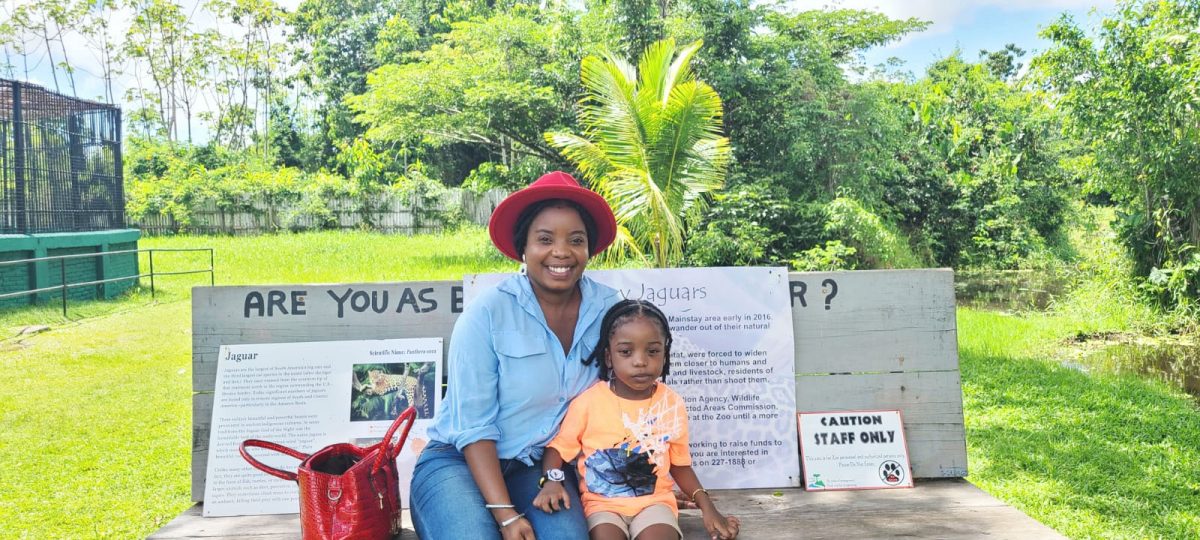Administrative manager at Link Up Media and What’s Happening Guyana is among the responsibilities Abigail Brower shoulders. She is also a dedicated actress and a devoted mother. Balancing motherhood, a demanding administrative role and a career in acting poses continuous challenges for Brower. At times, the juggling act became so overwhelming that she contemplated leaving her acting pursuits to achieve a better work-life balance.
The journey into motherhood coincided with a significant chapter in Brower’s life; her final year at the University of Guyana. During this period, she navigated the challenges of being heavily pregnant while completing her degree. After successfully submitting her final thesis, Brower welcomed her child into the world just three days later; a little boy named Dirar. The demanding nature of being a mother, coupled with her other professional commitments, has shaped Brower’s journey and challenged her to manage multiple roles in her life.

She shared that despite the encroaching fatigue, a parent must find ways to cope with the demands of raising a child. In 2019, she decided to take a sabbatical from stage acting and then in 2020, the COVID-19 pandemic struck, leaving every theatre actor without a job. The pandemic unexpectedly freed up a significant amount of time for Brower, allowing her to devote ample time to raising her son.
During this period, Signature Productions reached out to her and offered the role of Stacy, also known as Stacy from the Back-road, in the sitcom “Those People”. Contemplating whether to accept the role, she grappled with concerns about being a young mother and her pandemic-related paranoia. At that time, she was cautious about allowing visitors into her home. Weighing the pros and cons, she realised that the combination of becoming a mom and isolating during the pandemic had caused her to lose a part of herself.
Brower reflected on the impact of COVID-19, stating, “The thing with COVID is that I began to lose myself as Abigail. You’re now adjusting

to a new lifestyle of being a parent and the things you used to do, you no longer do.” She elaborated on the challenges she faced, including a loss of self-confidence and self-love. The isolation during the pandemic led to moments of introspection, where she found herself surrounded by four walls, struggling with sorrow and feeling hesitant to reach out for help.
Eventually, she reached out for assistance, describing 2020 – 2021 as some of the darkest days of her life. She sought counselling and was diagnosed with postpartum depression, an illness she concealed from friends and family. “I felt the world was crumbling; my world was crumbling, and there were no better days ahead,” she shared. Over-coming depression required substantial effort, but Brower recognized the necessity for a change in mindset. To embark on her therapy journey, she realised she needed to be her own advocate, steering herself away from the doldrums. With the assistance of talk therapy, she found herself in a better place. To this day, she actively pursues therapy, viewing it as a continuous effort to become the best version of herself. Brower advocates for therapy to become a norm in Guyanese culture, considering it a personal investment that enhances relationships with others. Additionally, she underscores the value of online support groups for women who have experienced postpartum, as they provide her with relief, comfort, and connections with others going through similar experiences.
Brower embraced the role of Stacy and the character struck a chord with audiences, transforming into a sensation. This success not only allowed her to connect with more people but also served as a confidence boost, providing her with a cathartic experience. When initially cast in the role, Brower grappled with self-consciousness as she had recently lost a significant amount of weight.
Stacy was unabashedly loud, boldly dressed, and indifferent to others’ opinions. She viewed herself as someone beautiful who unapologetically stood up for her beliefs. Portraying Stacy helped Brower embody these same fearless characteristics, fostering a sense of comfort in her own skin. Fans of the show embraced Stacy’s boldness without recognizing Brower’s initial discomfort. The newfound embrace of her character’s attributes had a profound impact on Brower, aiding her in embracing herself with greater confidence and self-assurance.
However, the success of the show and Brower’s newfound prominence introduced a fresh set of challenges. As she transitioned into a regular cast member, her schedule became more demanding, prompting her to reflect on the experiences of mothers who are also actors, especially those living alone with their children.
Motivated by her curiosity, Brower delved into research and discovered that the key to sustaining an acting career for many of these women was establishing clear boundaries and maintaining balance. She emphasised that one crucial takeaway was the significance of self-care. Brower highlighted the multifaceted roles that women in her position navigate, emphasising the importance of caring for their children, engaging with fans, and being present for loved ones. However, she underscored that neglecting self-care can be detrimental, emphasising the critical need for mothers in the acting profession to prioritise their own well-being.
Brower has incorporated a morning routine that includes meditation, prayer, and positive self-talk into her daily life. A devoted listener of Steve Harvey, she finds solace in his podcast, making it a consistent part of her routine. Beyond this, Brower indulges in her love for ice cream, occasionally treating herself. A glass of red wine accompanied by a good book, music, or an audiobook adds another layer to her relaxation techniques. In times of overwhelming stress, she also turns to the practice of deep breathing.
Emphasising the importance of balance, Brower stresses that mothers should strive to find equilibrium, especially when facing the challenges of life. She underscores that stress, if left unchecked, has the potential to lead mothers to lose themselves, ultimately affecting their ability to support and nurture their children. Brower expresses concern that negative emotions associated with stress may permeate a child’s environment, contributing to what she views as unhealthy parenting. Acknowledging the potential for children to adopt behavioural patterns from their parents, Brower advocates for effective stress management, believing it to be a crucial step in becoming the best role model for one’s child.
Being a role model, Brower believes, involves not only disciplining children for any wrongdoing but also the crucial step of taking accountability. She emphasises that simply disciplining a child is insufficient; parents must explain why the discipline was administered, creating an environment where the child understands the reasoning behind the punishment. Similarly, if a parent makes a mistake, Brower insists on the importance of apologising to the child, fostering a dynamic that establishes a safe space for the child to express their feelings when they perceive wrongdoing. Brower sees this approach as a means of breaking generational traumas, recognising that some of our actions are influenced by the traumas of our own childhoods, often unconsciously passed on to our children. Expressing hope for those struggling with mental health, Brower encourages individuals to find avenues that help them cope with life and foster self-improvement. “There are many people out there that may have been struggling with self-confidence, freedom of expression or public speaking and so on and they don’t have that solution or see their qualities and they should be able to find something to help that. For me, theatre has helped me with that,” Brower said. “I hope that people can find themselves in theatre, especially if they have a passion for it, so it can help them to express themselves and I find theatre helps with that. I think theatre is a very impactful community.”




